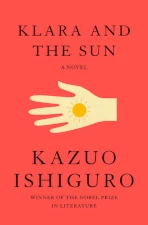Klara and the Sun

by Kazuo Ishiguro, 2021
This was just wonderful to read.
spoilers
The near-future scenario is revealed in a compellingly minimal way, teased in minor details. Eventually we piece together an epidemic of children without siblings, born into a competitive, authoritarian society. Higher-rank parents are able to purchase artificial friends, to help with the rigors of socialization. Klara, a newly activated artificial friend, demonstrates a lack of experience in dealing with human situations, but her efforts are unstinting, to understand what is going on within the family to whom she is sold, and do her best for them. Her earnest naivety as a narrator only serves to magnify the emotional impacts of the story, as her keen but inexperienced observation conveys everything we need to know about the dysfunctions of her tragic new family. She describes herself as feeling emotions, so the story is partly a discussion of what it means to be concious, to feel, as the humans around her are forced by circumstance into desperate schemes that expose the self-protective aspects of their love.
For all that, though, I'm not sure what to take away from it. Clearly the author is very skilled. It seems likely that metaphors are at work here. But, lunk that I am, I'm unable to discern what they are.
I'm fairly sure that the "boxes" Klara sometimes relates her perceptions being divided into are just stylish flair - a reference to the ways in which her brain works differently from ours, calving off processing into separate processors, or some-such, which comes to the fore when she is under stress, or deciphering complex emotions. I don't think this strikingly non-literal aspect is indicative of any deeper symbolism.
Sometimes, when I fail to pick up on metaphor, it's because religious allegory is involved. Beyond tales of mere personal transcendence, my brain just isn't wired that way. I can see that Klara is in many ways an innocent. Free not only of wrongdoing, but also of wishing harm, and - being made, not born - of original sin. On the literal level, this is emotionally resonant, especially when Klara's heroic contribution to the family is rewarded by being uncomplainingly discarded, like an appliance, at the end of the book.
But is this related to the other big clue about things I'm not picking up on - the title? I'm at a loss of what to make about Klara's relationship with the sun, which is a central plot point. Was Klara's bargain with her Sun god literally answered by a special burst of healing light, that saved her family's child from terminal illness? Certainly that is how Klara relates it. Could she perhaps have been imagining this? Might the recovery have been fated to happen anyway, and Klara's association with the burst of sunlight was all in her head? But the text tells us that the rest of the household are awestruck by the brilliance and beauty of that particular sunbeam, not just Klara. Later on, the questions Rick asks of Klara show that, although he does not understand, he has guessed the significance of the moment.
So. Klara the innocent's anthropomorphized Sun god's healing powers are real, and He answers her prayers to save the life of a child. And I don't know what to make of that.
Fortunately, I'm in good company. A quick search does yield intelligent writing about the book, but I don't see anyone coming up with aspects or metaphors that I've entirely overlooked - although that is usually quite fruitful when I search about other books that puzzle me. So I venture that I'm not the only one who doesn't get it.